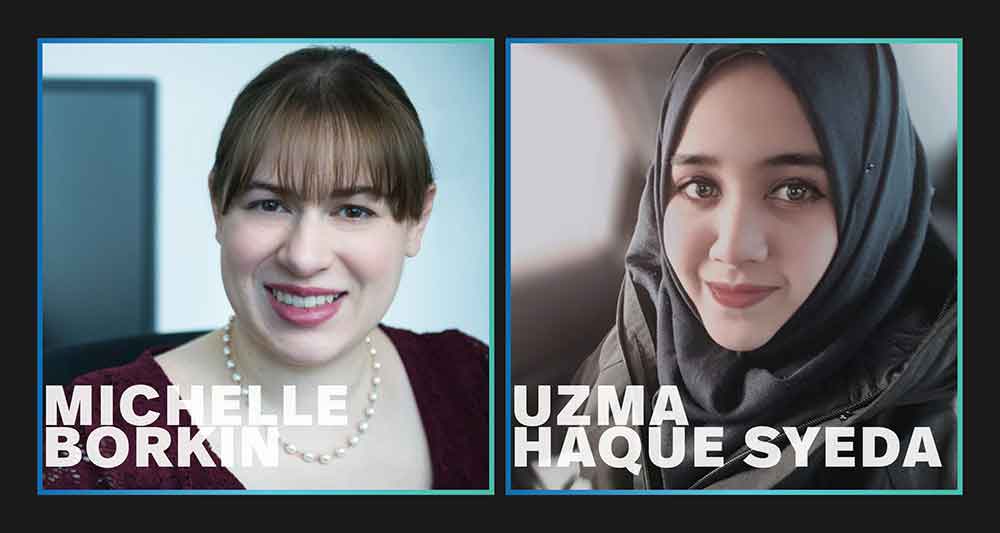Novel Framework for Implementing Design Studies Wins Best Paper at CHI 2020
Novel Framework for Implementing Design Studies Wins Best Paper at CHI 2020
Author:Gianna Barberia
Date: 05.28.20
It was 2:00 a.m. on March 6 in Boston, and Uzma Haque Syeda was wide awake and bursting with excitement.
The Khoury College PhD student had just received an email that her paper—co-authored by Khoury College Assistant Professor Michelle Borkin, fellow PhD student Prasanth Murali, and both Becca Berkey and Lisa Roe, who work at the Center of Community Service—was recognized with a Best Paper Award by the Conference on Human Factors in Computing Systems (CHI) 2020. The honor is bestowed only to the top one percent of accepted papers. Syeda stayed up for the next six hours, painstakingly waiting until after sunrise to share the good news with her co-authors.

“I still find it hard to believe that our paper got a Best Paper Award at CHI,” Syeda said. CHI is considered to be the most prestigious academic conference in the field of human-computer interaction. “It just feels too good to be true. It has surely inspired me to work harder and be a better researcher.”
The paper, “Design Study ‘Lite’ Methodology: Expediting Design Studies and Enabling the Synergy of Visualization Pedagogy and Social Good,” presents “a novel framework for implementing design studies with novice students in just 14 weeks,” according to Borkin, who developed the prototype. Borkin described design studies as a form of problem-driven research that investigates and solves real-world problems faced by domain experts through visualization of their data. Typically, the design study process can take several months or years.
“As design studies are such an important part of information visualization research, I worked to iterate and develop, through my visualization courses, a way to have students go through the entire design study process over the course of the semester,” Borkin said.
Borkin teaches data visualization classes at both the undergraduate and graduate level. Since joining the Northeastern community, she has made an effort to always include a Service-Learning component in the course curriculum. Borkin’s students have consequently taught data visualization at local high schools and worked with local non-profit organizations to help visualize and analyze the organization’s data.
“The Service-Learning curriculum is a win-win for the course and the local community partner,” Borkin said. “The students are able to apply their course knowledge in a real world setting and gain professional development skills unattainable in the classroom, and the non-profit partner is able to get free data analysis and visualization services normally unaffordable to the organization.”
When Syeda took Borkin’s data visualization course in spring 2019, for example, she worked on a design study project with Chester Square Neighborhood Association. The project involved visualizing the problems faced by the association with respect to a neighborhood park and providing the group with a way to better present their data to local/state authorities and the neighborhood residents. Her experience with the Chester Square project inspired Syeda, convincing her and Borkin that the methodology deserved further development.
“Going through the [Design Study ‘Lite’ Methodology] process myself helped me get a taste of what actual design studies are like and convinced me of its effectiveness,” Syeda said. “Thus, I was inspired to work on it and write the paper, as I strongly believed that incorporation of this framework in visualization pedagogy will help many students like me.”
Although Syeda does not come from a computer science background—she studied electrical engineering as an undergraduate—Borkin inspired her to apply to Khoury College. Syeda saw Borkin’s TEDxBoston Talk, “Astronomical Medicine,” and reached out, asking if she could work with her. Borkin now serves as Syeda’s PhD advisor for her studies in data visualization.
Now, Borkin and Syeda’s teamwork has resulted in the prestigious CHI award. Although the CHI 2020 conference has been cancelled due to the coronavirus pandemic, the cancellation has not stifled Borkin, Syeda, and their co-authors’ enthusiasm for their data visualization work or new methods for teaching it.
“I was overwhelmed when I received the email,” Borkin said. “Both elated and humbled at the same time to receive such an honor.”
Borkin is also thankful to the Northeastern community and Khoury College for their unique support of research and teaching.
“It was only in the supportive environment of Northeastern, including the Service-Learning program, as well as support for social impact and diversity and inclusion at Khoury, that Uzma, I, and our co-authors were able to execute this impactful work, which included valuable research, pedagogy contributions, and social impact,” Borkin said.